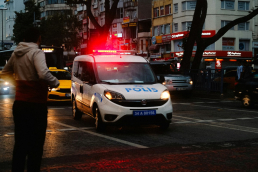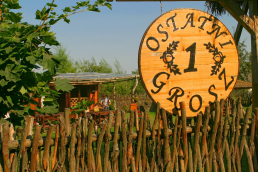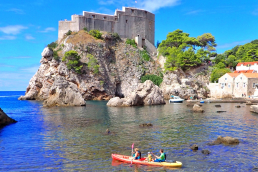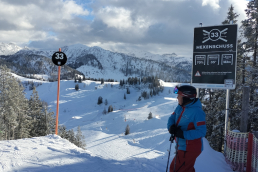Harry Teocharis: the digital passport is our only chance. This year to Greece only with a test or vaccination
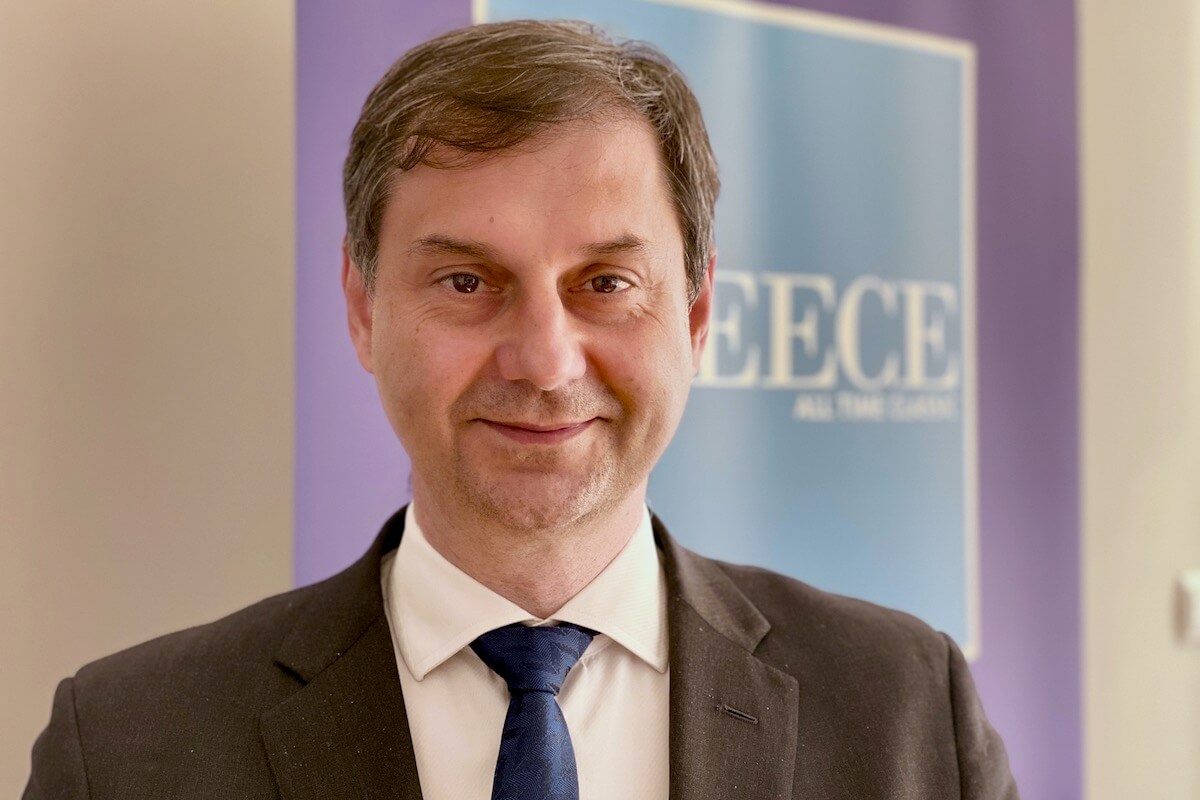
Introducing cheap and fast antigen tests instead of PCR – this is a travel facilitation that Greece is working on. This year, the situation with the virus variants is different than last summer, so there is no question of a complete lifting of health requirements for travelers. That is why Greece has been trying to introduce a digital health certificate in the EU since January. We talk to Harry Teocharis, Greece’s tourism minister, about this year’s holiday in Greece.
Marzena Markowska: Please tell me a bit about your visit to Poland. What is its purpose?
Harry Teocharis: I’m in Warsaw because the Polish market is very important to us. Poles and Greeks have a lot in common, many of them choose Greece as their holiday destination. We would like to discuss the season opening with our partners and explain our security system.
We want to make sure people understand our requirements and know what to expect. We want to ensure that the procedures are very transparent because we believe that this is the only way forward for tourism. So I meet journalists, tour operators and, of course, my counterpart in the Polish government.
MM: What do you expect from the meeting with the Minister of Tourism in Poland?
HT: It is very important for me to understand the efforts to introduce an electronic health certificate. This is an idea that we want to spread. Initially, it was met with skepticism in many countries. But I think many governments now understand that this is a necessity, an important step towards normality.
We are technically ready to implement this solution throughout Europe. We have our own quite advanced electronic system that issues such certificates in Greece. On January 12, our prime minister sent a letter to Commissioner Ursula von der Leyen on this matter. We need this certificate throughout the EU to restore free tourism. It is one of the four pillars of the freedom of movement in the European Union.
In Greece, this solution already works, I use it myself every time I travel. The certificate has a QR code and a digital signature, it cannot be used on any other name. It contains information about a negative test result from any laboratory in Greece and information about the vaccine received. All we have to do to connect it with Europe is to do some trials and tests.
MM: In Greece, the certificate is only for crossing the border or does it entitle you to something else?
HT: Currently only for international travel. It is possible that this application will be extended depending on how things turn out. But I think we will be moving in a more traditional way, opening the economy without any internal passes. However, in the case of international travel, we believe that it is a necessary solution.
MM: There are news in the media that Greece is eager to open up to markets also outside Europe, such as the United States. Can Poles also travel to Greece?
HT: We have been open to tourists from Poland since April 19, but only nine airports are in operation. From May 14, all of them will be open. To come to Greece you must have a covid-19 vaccination certificate or a negative PCR test result. We are working on allowing cheaper antigen tests instead, but I cannot give a specific date when this regulation will come into force.
Passengers can also be randomly tested upon arrival at the airport. If the outcome proves positive, they will be isolated, at the expense of Greece. Our government will cover everything – quarantine accommodation, including accommodation for accompanying persons.
Besides, there are no differences in regulations for Greeks and foreign tourists on site. We also don’t have vaccinated-only restaurants or tourist-only restaurants, etc. There is one set of rules for everyone.
MM: How many people are currently working in the Greek tourism industry?
HT: It depends a bit on the season, but on average it’s about 100,000. people.
MM: Is there a special vaccination program for them first?
HT: We started a special program, but also accelerated with vaccinations in general. We have just started vaccinating people over 30. We also encourage companies to vaccinate their employees, including people from the tourism industry.
MM: What percentage of Greek society is currently vaccinated?
HT: We currently have about 25 percent. people vaccinated with the first dose and about 11-12 percent. two doses.
MM: When it comes to making travel easier, this season we can count on the introduction of antigen tests instead of PCR or is there being considered a lifting of health requirements at all, as in summer 2020?
HT: Last year we did not do any tests during the summer holidays. But the epidemic situation was also different, we did not deal with different variants of the virus, some of which spread faster. Therefore, rather than abolishing tests, we are working on introducing the possibility of replacing PCR tests with antigens. They are faster, cheaper and are a small barrier to travel
MM: Will such a test be possible at the airport upon arrival?
HT: No, as with the PCR test, it will have to be done before departure.
MM: But still, if I fly to Greece and I am not vaccinated, will they be randomly selected for another airport test?
HT: Yes, but this applies to a small percentage of travelers.
MM: Do I have to purchase covid insurance before coming to Greece?
HT: There is no such requirement. Both possible quarantine and other costs in the event of an infection on the spot or a positive test result in a random test at the airport will be covered by our government.
MM: Will there be countries for which Greece will remain closed in the summer?
HT: Yes. We are trying to reopen our most important markets, which are EU countries and 15 non-EU countries, including Russia, Great Britain, and the United States.
MM: What will the sanitary regime look like this year? Is it similar to last year? Less or more stringent?
HT: I think tourists can expect more or less the same, with a little change. For example, an open buffet in hotels will be allowed, with mandatory gloves and masks. Hotel rooms will be cleaned more frequently. We introduce facilitations rather than additional restrictions.
MM: What about the masks outside? The obligation will be lifted?
HT: Outdoor masks are still compulsory these days, but you don’t have to wear them on the beaches. However, when walking down the street, applying them is obligatory. We’ll see if that changes in the summer. I’m sure it will happen at some point. As vaccinations are going smoothly, I believe things will keep getting better.
For now, we know the dates of the opening of the economy. The beaches will open on Saturday. Archaeological sites can now be visited, museums will resume operations on May 14. Restaurants are already open, travel between regions is possible. Sailing is allowed with certain restrictions.
MM: Are there any facilities that will be closed all summer?
HT: I don’t think so. I am convinced that the vaccination program will have a big impact. The number of daily infections drops by 10 to 15%. weekly. We are seeing the situation in the countries that vaccinated society faster, so we know what the infection decline curve will look like.
That is why we were the first country in Europe to want to open up and talk about summer vacations. With vaccinations, we can look to the future and plan to open up the economy ahead of time. It seems very, very strange to me, not all countries follow this strategy. After all, we know what the vaccination rate is in the EU and what will happen in three or four weeks in Poland, Greece and other countries. For the first time since the epidemic started, we can plan something. Of course, no one has a contract with the virus. But the data logically indicates that we will remove the restrictions this summer.
MM: What is the situation of the Greek tourism industry at present? Are the effects of the crisis already visible?
HT: It is not easy for tourism companies, the time behind them is very difficult. We supported everyone during the crisis by offering funds for employees, self-employed people in various industries: hotels, transport companies, travel agencies.
It was a very difficult period. We managed to keep the business alive and not lose jobs. Now an even more difficult transition is coming. We are pushing hard to restart the economy, we will keep the support for a while, but at some point we will have to stop it. Then it becomes clear what the real situation in the industry is.
MM: Certainly, the market will not return to its pre-epidemic state right away.
HT: That’s why we keep support during the lockdown and for some time after it’s taken off
MM: How much was government aid for companies?
HT: In total, we spent EUR 24 billion in 2020, this year another EUR 14 billion. This is a lot of money, it was not only spent on tourism, but most of it was spent on this area of the economy. It is not easy to continue this level of support, we have to slowly change tactics. It is not a Soviet-era economy, it cannot be supported all the time. Subsidizing business from the budget is not a long-term solution. We have to go back to the real economy.
MM: But we are also all counting on the European reconstruction fund. How will it be implemented in Greece in the tourism segment?
HT: We will use three horizontal pillars: educational, sustainable and digital to improve the basic components and how they work, and to increase the quality of the product. Vertical pillars to support areas that are neglected. We will invest in the infrastructure of winter and health tourism, and mountain tourism.
MM: How many hotels in Greece have closed completely or have been bought by foreign investors?
HT: We don’t have many bankruptcies or big sales. I think they are yet to come because the economy is still receiving support at the moment. So as I said, maybe you should ask me about it in a few months.
MM: What are the data on tourism from Poland to Greece last year?
MM: Poles were number one when it comes to our arrival markets. Their number dropped only by 40 percent. compared to 2019. It was the best market for us, it recorded the smallest decline in all terms. That is why I am here, Poland is now a priority for us.
Travelplanet: 2/3 klientów wybiera na „czerwcówkę” Turcję, Grecję lub Egipt
POWIĄZANE WPISY
24 listopada 2025
All Stars of the Sea: MSC podsumowuje sezon 2024/25 i nagradza partnerów
Najważniejsze inwestycje technologiczne, modernizacje statków i rozwój produktów premium…
0 Komentarzy5 Minuty
8 października 2025
Anex Tour wyjaśnia: doniesienia o zatrzymaniu właściciela są nieprawdziwe
Po serii publikacji w tureckich i zagranicznych mediach, które sugerowały zatrzymanie…
0 Komentarzy2 Minuty
2 maja 2025
Austriackie warsztaty w Warszawie
24 kwietnia br. Austria Info zorganizowała warsztaty dla biur podróży. Austriackie…
0 Komentarzy1 Minuty
16 kwietnia 2025
Podlaski Bon Turystyczny rusza od Wielkanocy
Ponad 500 przedsiębiorców bierze udział w Programie Podlaski Bon Turystyczny. Od…
0 Komentarzy2 Minuty
17 marca 2025
Chorwacja zaprasza do Dubrownika
Chorwacja zaprasza do zwiedzenia Dubrownika i okolic. W sezonie mamy tam bezpośrednie…
1 Komentarz2 Minuty
6 lutego 2025
Samnaun w Silvretta Arena – wolnocłowe narty
Bombonierkowa miejscowość u stóp jednego z największych regionów narciarskich to…
0 Komentarzy7 Minuty
6 lutego 2025
Salzburger Sportwelt – region z pięcioma gwiazdami
Jeden z najciekawszych regionów w Austrii rzuca narciarzom wyzwanie – zdobądź 12 szczytów…
0 Komentarzy10 Minuty
13 stycznia 2025
Rekordowa suma zebrana podczas IV Gali Waszej Turystyki – ponad 243 tys. zł na Dom Dziecka w Kłodzku
IV Gala Waszej Turystyki zakończyła się sukcesem, jakiego jeszcze nie było – rekordowe…
0 Komentarzy2 Minuty
28 grudnia 2024
100 najbardziej wpływowych osób w polskiej turystyce 2024
Po raz dziewiąty ogłaszamy Listę 100 najbardziej wpływowych osób w polskiej turystyce –…
0 Komentarzy87 Minuty



